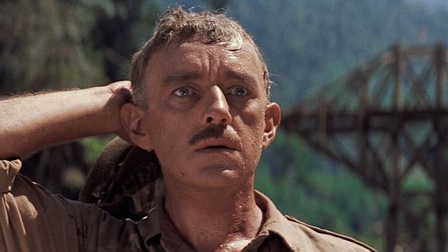The Second World War is one of the most revisited and re-imagined real-life scenarioes in human history and with the benefit of hindsight, the Greatest of Wars inherently tells stories of the best and worst of humanity, heroes and villains, the destruction of Europe before it rebuilds itself for the second time in half a century, the destruction and rebuilding of Japan in the wake of the single most devasting weapon ever created, millions dead and injured, and the restructuring of Western society and its norms. Bridge on the River Kwai is an essential piece of cinema, has been for nearly 50 years, and it tells of a bizarre story of heroism and pride that is emblematic of the British spirit, and how that pride can blind as well as give strength.
In the Pacific Theatre, Veteran British Officer Lieutenant Colonel Nicholson (played by Sir Alec Guiness, in his most famous role outside of the robes of Ben Kenobi in Star Wars) leads his troops into the Japanese-run Burmese prison of Saito (Sessue Hayakawa). Saito is a spiteful, proud and foolish warden, easily insulted and easier mocked, and as was the reality of the Pacific War, was incredibly cruel to his prisoners. As Nicholson's men arrive at Saito's prison camp they are all ordered to work on the construction of both the Burma railway and a bridge for said railway over the Kwai River. Nicholson refuses to include his officers in this manual labour and Saito forces them to remain standing at attention for a full day in the intense tropical heat before confining them to small and restrictive huts. This causes unrest among the prisoners and longtime US Navy prisoner Shears (William Holden) uses this as his opportunity to escape the camp. As Shears is later coerced to liberate his comrades from Saito's prison camp and destroy the bridge by the British authorities in the area, Nicholson intends to use the bridges construction as a tool to maintain his men's pride, morale and cohesion as a unit. But in doing this, Nicholson himself becomes so enamoured and proud of their work that he becomes oddly protective of his precious bridge, a change that brings his downfall.

Based on the novel of the same name by Pierre Boulle (who also wrote the Planet of the Apes novel), Bridge on the River Kwai is one of the most influential films by the legendary David Lean (director of Lawrence of Arabia, Doctor Zhivago, Brief Encounter). The film captures the dangerous, though gorgeous jungles of South Asia (filmed in Sri Lanka) in stunning wides and its nearly omniscient presence in mediums, in no small part because of Jack Hildyard's cinematography. The film covers the threat, horror and humanity of war with little to no actual battle sequences, though the few moments of action and violence are both thrilling and engaging. Sir Alec Guiness is the perfect vehicle for the phrase "the pride before the fall", as his stoicism, defiance, and his"stiff upper lip" is beyond endearing through the tortures he experiences under the cruel and vain Saito. His war of the wills with such an authoritarian as Saito is made that much more bold by usurping the Japanese captains authority from such a state of physical inferiority, literally commanding respect, and later the Japanese soldiers in addition to his own.
Bridge is slow and deliberate, in its pacing, in its performances, and quietly charming, with director Lean and actor Guiness both at the top of their game. Bridge on the River Kwai is certainly and rightfully the classic war film it is claimed to be.



No comments:
Post a Comment